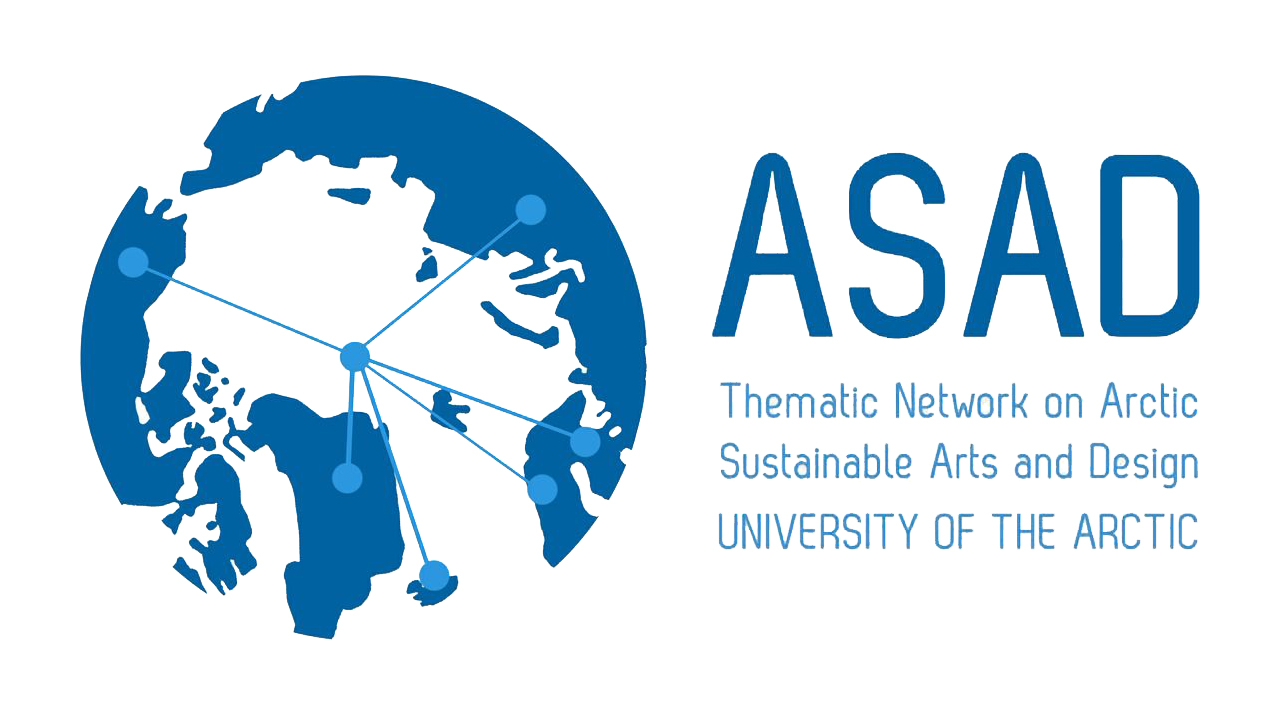RELATE NORTH (12): New Genre Arctic Art Education at The University of Lapland 4 -7. Nov, 2024
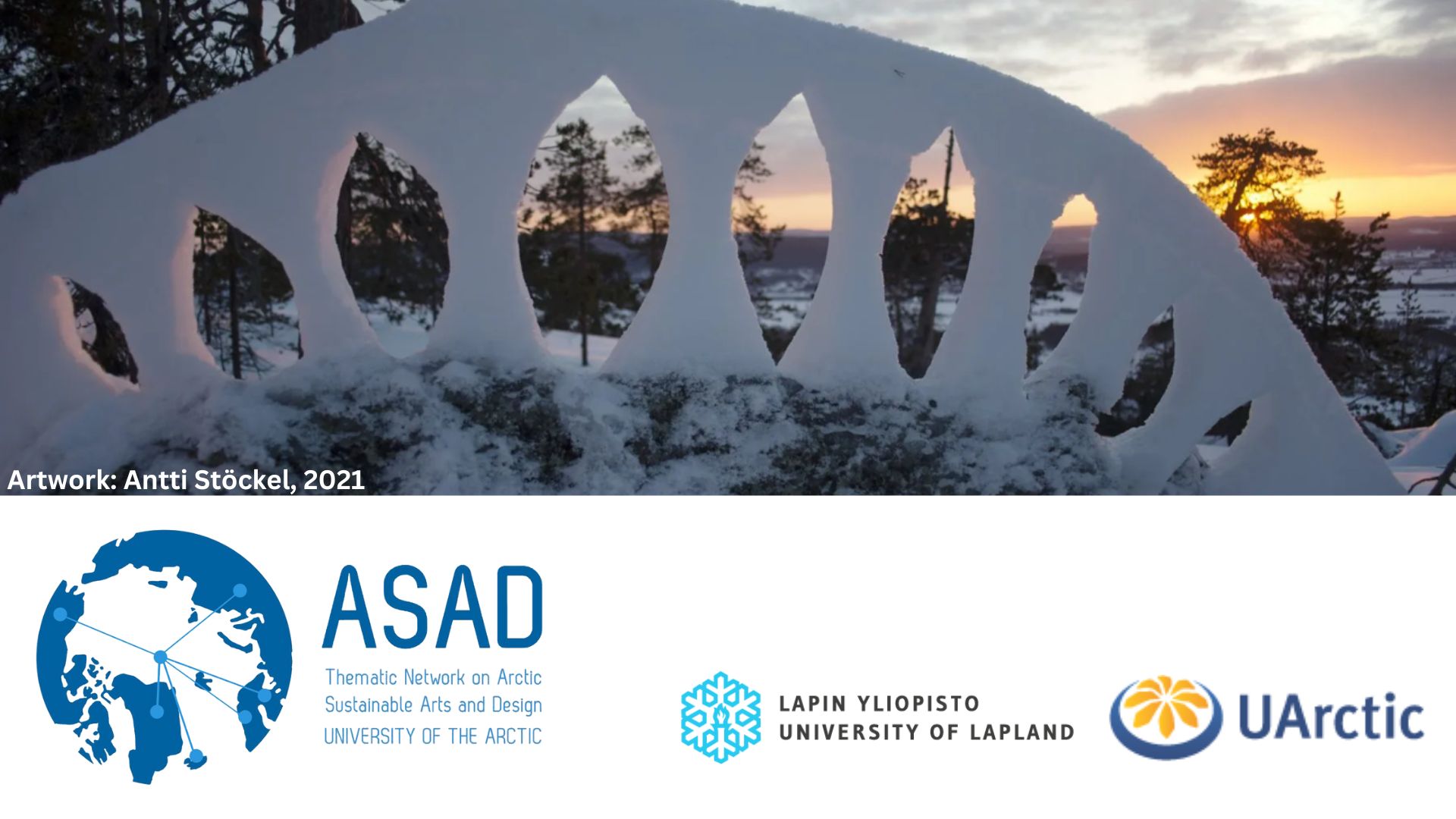
Join us in Rovaniemi
The Arctic Sustainable Arts and Design thematic network (ASAD) hosts the network’s twelfth annual symposium and exhibition, Relate North: New Genre Arctic Art Education. The event is a collaboration between the ASAD network and the University of Lapland. The ASAD Network aims to identify and share innovative practices in learning, teaching, research and knowledge exchange across art, art, design and visual culture education. The network promotes cooperation and collaboration between academic institutions and communities to work towards a shared understanding of critical issues relevant to people living in the North.
Program at Glance
Network and ASAD-project meetings on Monday 4th November, 2024 at 10am-4pm, Faculty of Art and Design
Opening of the Relate North #12 on Monday 4th November, 2024 at 18.00, Faculty of Art and Design
- Performance by a writer and musician Jalvvi Niillas Holmberg
- Reception of the city of Rovaniemi
- Openign of the Relate North exhibition
Keynotes and abstract presentations
- Tuesday 5th November, 2024 at 9am-6pm
- Wednesday 6th November, 2024 at 9am-5pm
- Thursday 7th November, 2024 at 11am-1pm
Dinner and a performance by the Dance Theatre Rimpparemmi on Wednesday 6th November, 2024 at 6 pm-10 pm
- dinner at 6-7 pm
- performance 7pm -8:30 pm
- venue and bar is open until 10 pm
Closing of the event on Thursday 7th November, 2024 at 1 pm-1:30 pm
Registration
All speakers, artists and participants must register for the conference and pay the registration fee. The registration deadline is 31 October 2024. Please register for the conference as well as for social programme and visits by using this online registration form.
The conference registration fees are:
- Participant: 100 €
- PhD Student: 40 €
- Bachelor and Masters degree student of the University of Lapland DO NOT register and do not need to pay.
Participants are encouraged to register in advance and as early as possible and make the hotel booking. November is high travelling season in Rovaniemi.
The registration fee for participants in situ includes:
- admission to all sessions
- Exhibition opening and Rovaniemi city reception (Mon 4 Nov)
- coffee/tea during breaks mentioned on the programme
- conference materials
The registration fee for participants online includes:
- Stream of keynote presentation
- Session of online paper presentations. Only some session will be facilitated online.
There is a separate fee for Dinner and dance theatre performance by the Rimpparemmi (Wed 6 Nov): 75 €
The event is not open to participants residing in Russia. The ASAD-network has suspended collaboration with Russian entities due to the Russian invasion of Ukraine.
Payments
The registration fees include the VAT 0%. Please note that all payments must be made in advance and in euros (€).
Please choose your payment type on the online registration form. The options are
- Online bank transfer (Finnish banks)
- MobilePay, Pivo and Siirto.
- Online credit card payment (Visa, MasterCard, EuroCard, Amex)
- Invoice will be sent to you separately by the conference office. Please remember to specify the invoicing address on the registration form. Invoicing fee 10 € will be added to all invoices. You can request for group invoice by sending email to congress office (congress@ulapland.fi).
Cancellation Policy
Cancellations must be made in writing to Rovaniemi-Lapland Congresses (congress@ulapland.fi). Registration fee will be refunded if cancellation is received by 13 October 2024. No refunds will be made after this date. Please note that a processing fee of 30 € will be deducted from all refunds. Transferring registration to another participant is free of charge.
Postdoctoral researcher, Rauni Äärelä-Vihriälä (Sámi): Sharing stories to build better sustainable future- overwiev of Sámi pedagogy
Storytelling is a method in Sámi education for understanding the values, customs, and worldview of the community. Through stories, the environment and its events are narrated, spanning from the past to the future. In the oral tradition, stories are passed down from generation to generation, bringing tales preserved over centuries into new contexts. At the same time, new stories emerge, reflecting the experiences of a people living in harmony with nature’s cycles, as they face our changing environment. In Sámi education, storytelling focuses on the communal experience, where new generations shape their understanding of the world. In a time when answers are actively sought to stop climate change and promote sustainable development, stories can play a significant role. In education, sustainability and the changing climate should be addressed through the experiences of children and young people. Experiential and place-based learning is reflected in stories, which help in understanding the relationship with nature, place, and sustainability.
Rauni Äärelä-Vihriälä, PhD, is a postdoctoral researcher at the University of Lapland, Faculty of Education, working with the REBOUND project that is funded by the Strategic Research Council (SRC) established within the Research Council of Finland. The project concentrates on questions of intergenerational green transition. Her research fields are in Sámi education, especially digital learning, language immersion, and language revitalisation
Art Program
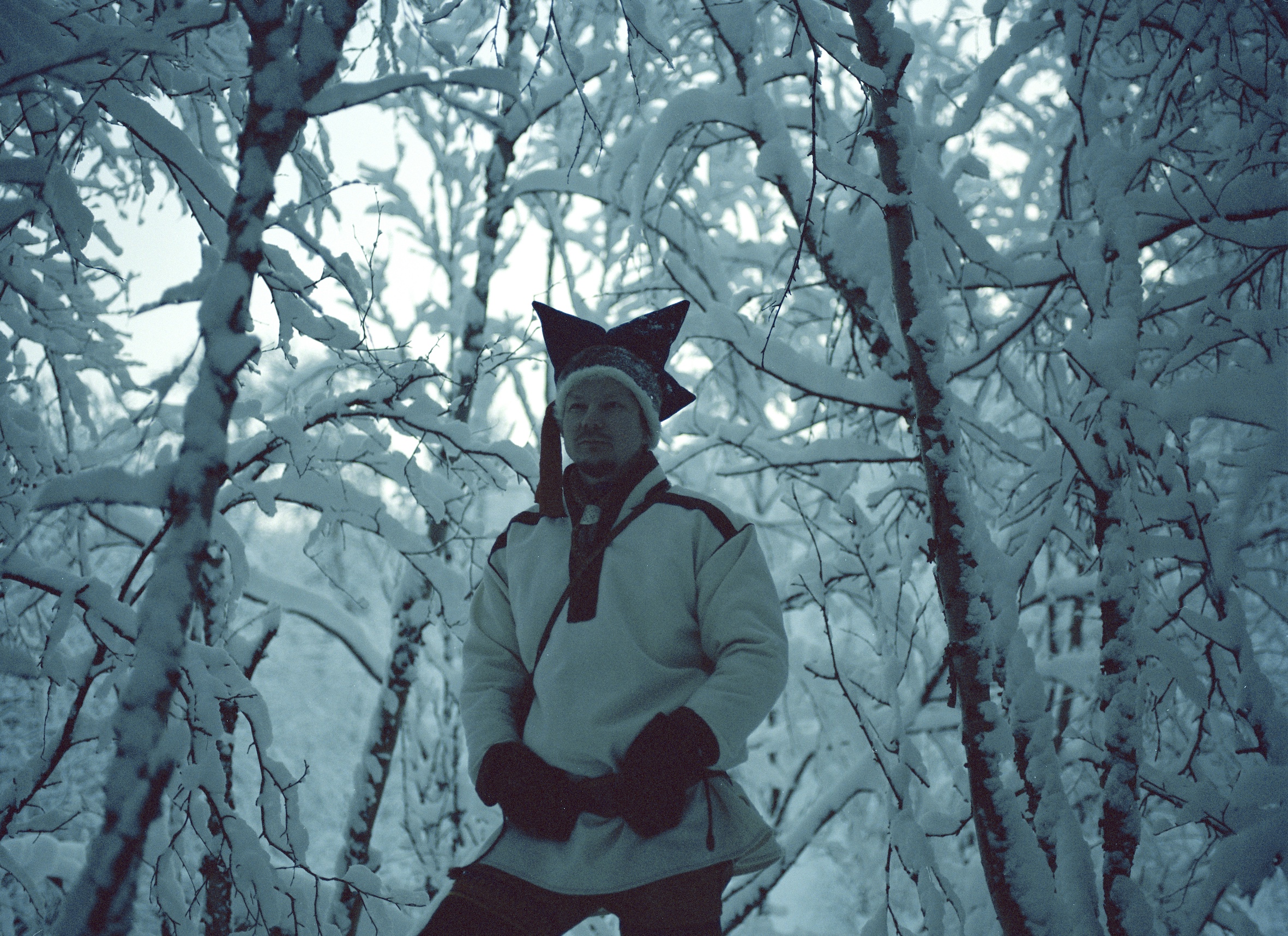
Jalvvi Niillas Holmberg
Jalvvi Niillas Holmberg is an award-winning author, scriptwriter and musician from Ohcejohka, Sápmi. His literary works include prose, poetry, drama and screenplays. In the field of music he works mainly as a vocalist and lyricist. Besides working solo he has performed with philharmonic orchestras and several genre-defying bands. He is well versed in the Sámi yoik tradition. For more than a decade, Niillas has been involved in several movements against extractivism in the traditional Sámi areas. The thematics of his works often encompass land-based knowledge and anti-colonial aspects.
Holmberg performs in the opening event of the Relate North on Monday 4th of November at 6 pm
Free event for Relate North symposium participatns.
Photo by Lada Suomenrinne.
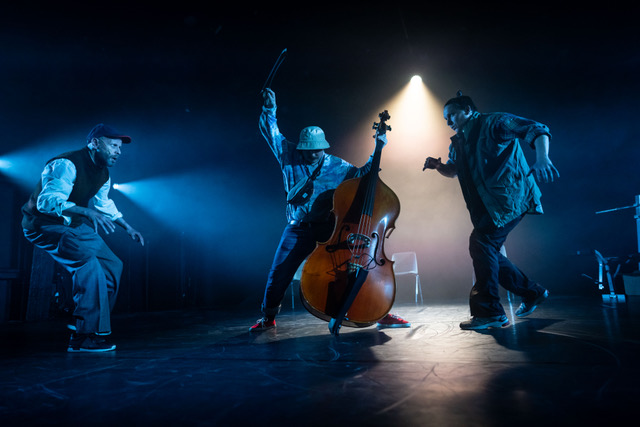
Rimpparemmi Dance Theatre
Rimpparemmi Dance Theatre is the northernmost professional dance theatre in Finland. The rough expressive power of folk tradition is combined with the fluidity of contemporary dance in Rimpparemmi’s performances. Music plays a significant role in all their activities.
Rimpparemmi Dance Theatre produces dance theatre performances in Rovaniemi at the Dance Stage in the Wiljami Cultural House. The conference dinner is served in the same locations.
Wednesday 6th November, 2024 at 6 pm-10 pm. Registration fee is 75€
Photo by Antti Kurola.
Dinner will be made by the Kahden kokin catering.
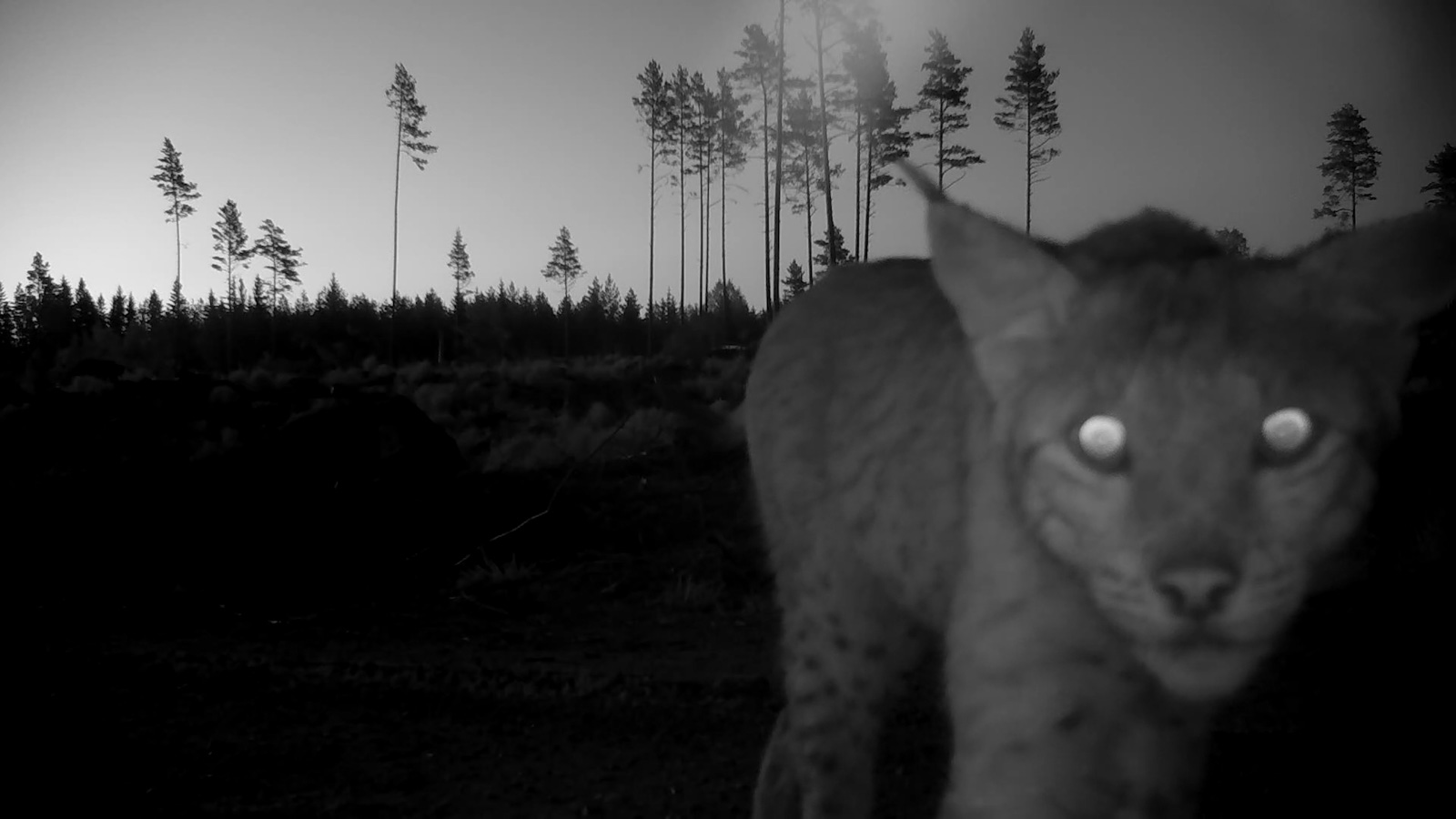
Lynx Man
Relate North #12 will feature Juha Suonpää’s film Lynx Man in the Mauri Hall. Free entry to available seats: symposium participants will be seated first.
Following divorce and a serious accident Hannu lives alone on his farm in the West of Finland. An environment home to all kinds of wildlife – including the Eurasian lynx, a wildcat until recently almost extinct. When Hannu finds a dead lynx by the side of the road, it is like meeting an old friend: he realizes that the lynx who lived in the area during his childhood have returned. Filled with renewed vigour and lust for life, Hannu sets up trail cameras all over his land. Soon, 23 cameras are recording everything from moose to mice. Hannu starts to get to know the lynx personally, learning their habits and habitats, relationships and individual characteristics. The spirit of the lynx permeates deeper and deeper into Hannu’s world as he becomes increasingly fascinated by theirs.
Juha Suonpää (b. 1963) is an Adjunct Professor in Art, Environmental and Nature Photography, a photographer and filmmaker. Suonpää works as the principal lecturer of visual culture in the International Degree Programme in Media and Arts at Tampere University of Applied Sciences, and as a Senior Academy researcher in a research project of Finnish Academy. Suonpää has exhibited internationally and published documentary films, numerous academic monographs and articles and researched, for example, topics related to photography, visualizing science and the construction of the identity of a place. Suonpää’s earlier film Wolfman premiered at Visions Du Reel Film Festival in 2013.
Welcome on Tuesday, November 5th, 5:30 PM in Mauri Hall.
Keynotes
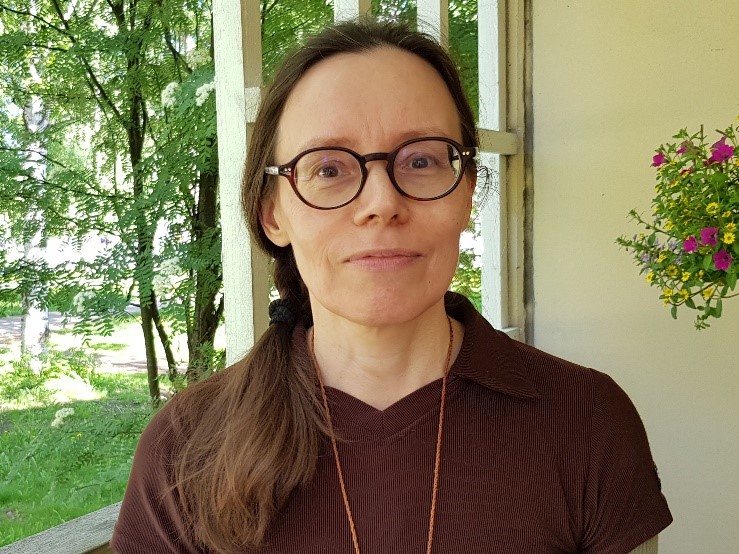
Senior Lecturer, docent of duodji, director of Giellagas Institute for Sámi Studies, Sigga-Marja Magga: Ethics and care in Indigenous art and craft exhibition
Collecting and displaying Sámi material heritage is today’s way of presenting the Sámi history, life and visions of the future. The move from family collection to art gallery exhibition changes the private and intimate parts of Sámi tradition public, open to generalization and evaluation. The presentation addresses what kind of ethical considerations are bound to collecting work and how care taking is part of those ethical issues.
Sigga-Marja Maggas research interests include the political resistance, norms, and gendered practices associated with Sámi duodji and Sámi dress. She works closely with Sámi communities and has developed duodji-research also with her own duodji production.
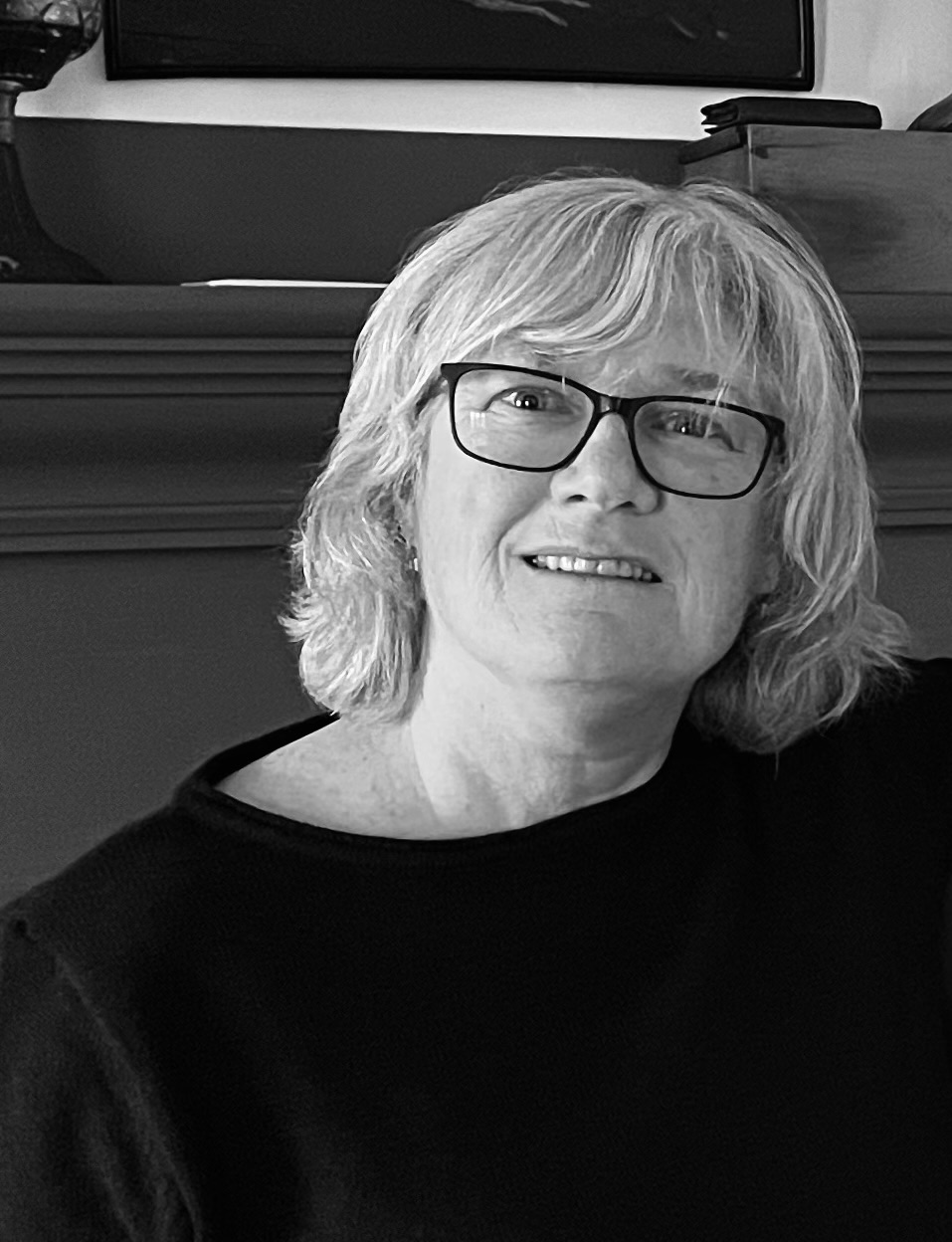
Dr. Suzanne de la Barre: Creative Tourism as a way to consider sustainability and the creative sector in the Arctic
The creative sector is a dynamic tool for communities to express themselves and is at the heart of how they engage with placemaking. Climate and cultural change are two forces that influence the creative sector in an Arctic setting. Using a creative tourism lens, this presentation aims to propose and solicit ideas on what we might investigate to contribute to the sustainability of the rich offerings of this sector.
Dr. Suzanne de la Barre is a hobby artist with a research practice in community development and the creative sector in northern and Arctic regions. An Honorary Research Associate with Vancouver Island University, and faculty member in the UArctic’s Graduate Certificate in Northern Tourism, she lives in Whitehorse, Yukon (Canada). Check out her recently published chapter: A Future for Creative Tourism in the Arctic
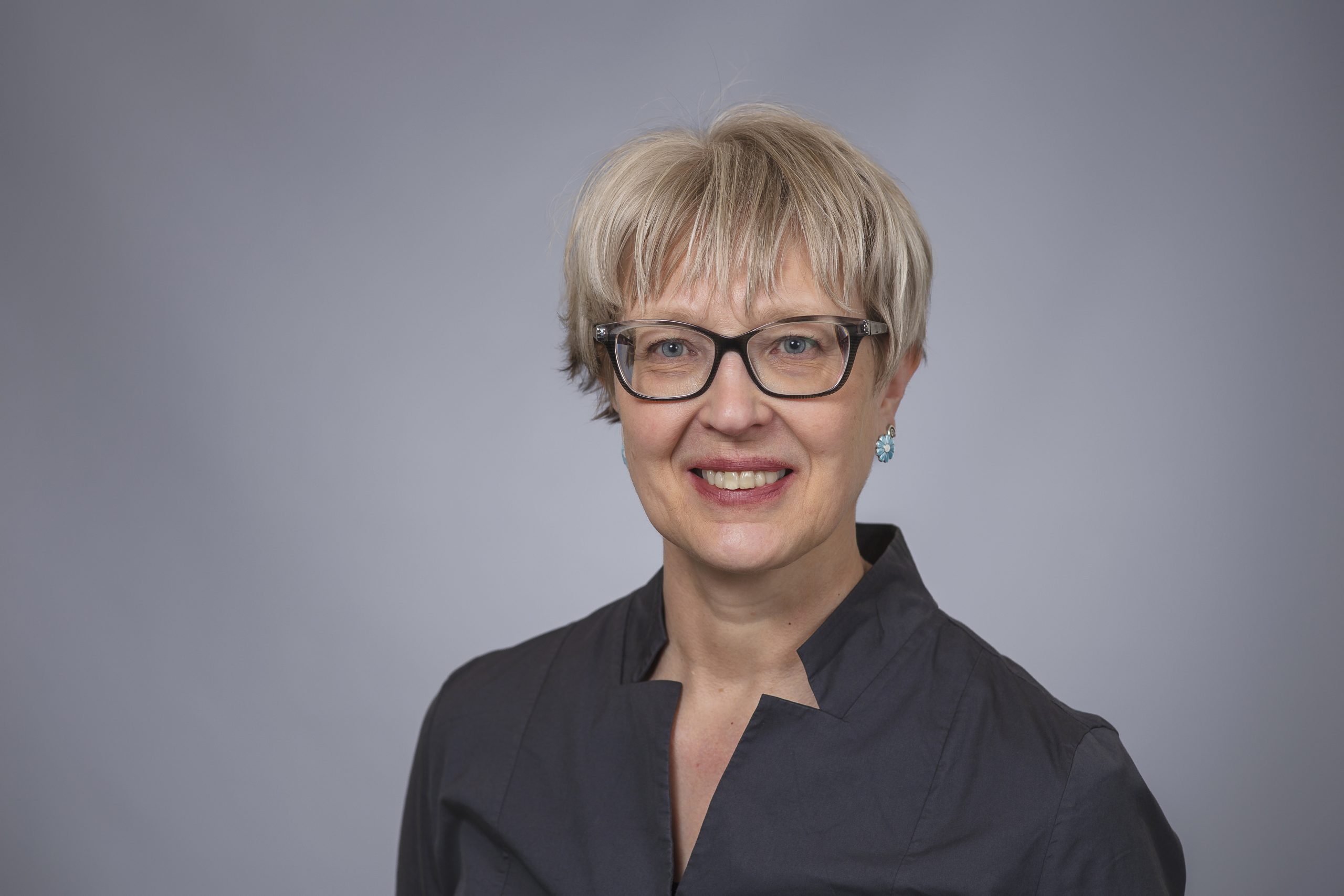
Professor Cindy Kohtala: Transforming Design and Design Education in the Arctic
Design education has been questioning its foundations as well as its futures for decades. The transformations of post-industrial political economies in the North cause design educators to continually re-evaluate what future designers will and should do. Especially now in the face of increasingly dire social, political and environmental crises, which impact the Arctic in particular ways, calls to transform design education feel more urgent than ever. Design practice, research and education for sustainability transformations means attention to communities’ capacities to design their own pathways to more ecologically attuned lifeways. It also draws attention to designers’ capacities to orient in such fluid and shifting digital-material, socio-technical contexts. It appears fruitful to turn again to where design, art and craft meet – as well as diverge – to address post-sustainability concerns in design education.
Dr Cindy Kohtala is Professor in Design for Sustainability at the Umeå Institute of Design and programme director of the MFA Interaction Design programme. Her research focuses on how active citizens experiment with sustainability hands-on and materially at the grassroots. She studies industrial transition at the local scale: how communities localize technology and manufacturing and build infrastructures for alternative ways to design and make. Kohtala has taught design-for-sustainability at Umeå University, Sweden, Aalto University, Finland, and as a guest teacher in Mexico, India and China. She is an active member of the international design-for-sustainability networks LeNS and o2 Global.
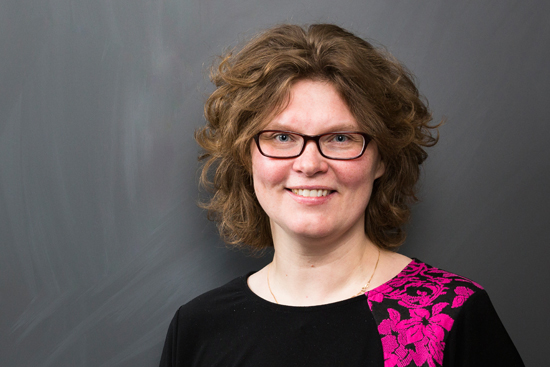
Professor Jonna Häkkilä (FI): Engaging with Northern Cultural Heritage through Digital Technologies
Jonna Häkkilä is a User Experience (UX) professional and leader working at the intersection of technology, design, and users. She possesses a rare combination of technical and hands-on user-centric design expertise, with experience in both business units and research departments. Her strength lies in blending product development with visionary research, swiftly turning abstract ideas into concrete actions. She is passionate about her work and loves experimenting with new ideas.
She is a professor of Industrial Design at the University of Lapland, Finland, and a docent at the University of Oulu, Finland. She served as UX Director and research team leader at the Center for Internet Excellence from 2012 to 2014. Prior to that, she worked at Nokia Research Center from 2007 to 2011, where she built two high-performing concepting and UX research teams, as well as led several UX research projects in the fields of mobile and ubiquitous computing and advanced graphical user interfaces. She is also a co-founder of the UX design house Soul4Design.
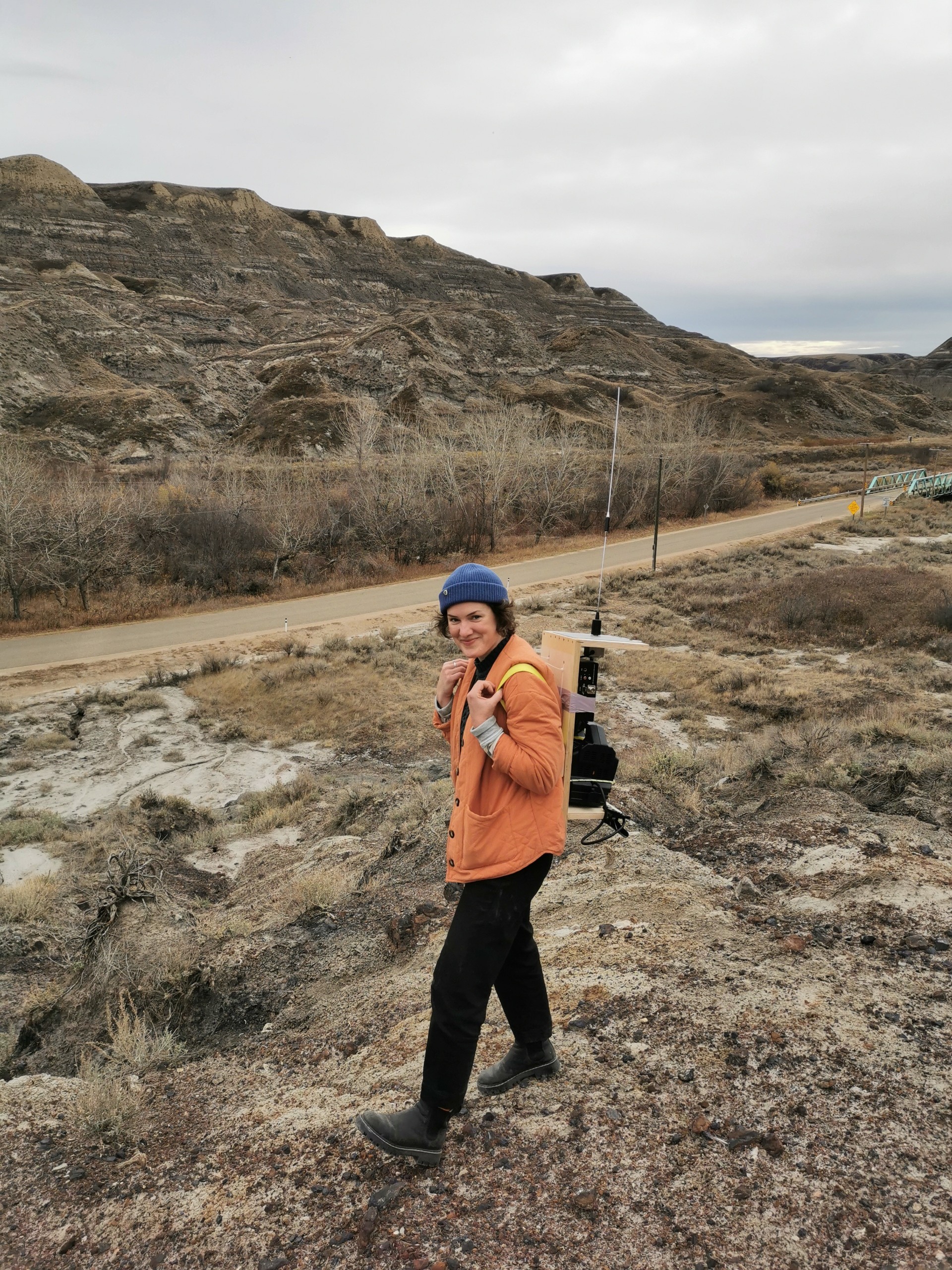
Aubyn O’Grady: Everything is getting milder
In this keynote Dr. Aubyn O’Grady explores practical examples of what works- small, meaningful actions we can implement in our teaching, art, and research practices, and what doesn’t work- theories, structures, and institutions that need to “die a good death” (Vanessa Machado de Oliveira, Hospicing Modernity).
Drawing on her experiences as the Program Director and Chair of the Yukon School of Visual Arts, O’Grady invites artists, researchers, and educators working in the North, and in (sub) arctic communities to start engaging in “risky behaviors” to reorient how we teach and learn in ways that are attuned to the realities of our unique locales.
Grounded in place-based thinking, this talk challenges conventional academic expectations and encourages art educators to ask more radical questions: What role can institutions play in addressing local housing crises? How can artists engage with complex issues like land claims and community resilience in the face of climate change? Ultimately, O’Grady calls for an educational paradigm that is deeply attuned to the lived experiences and needs of our communities, the land, and reconnection in a rapidly changing world.
Dr. Aubyn O’Grady is the Program Director of the Yukon School of Visual Arts (Yukon SOVA) in Tr’ondëk Hwëch’in Territory, Dawson City, Yukon (Canada). Aubyn’s research-creation practice is concerned with artist-led schools, the ethics of site-specific and land-based artworks, and artist engagements with rural places. Her art practice requires frequent and enthusiastic collaborations, and Aubyn can be credited with conceptualizing the Dawson City League of Lady Wrestlers (2013-2017), the Swimming Lessons Aquatic Lecture series (2017-2018), Local Field School (2020+), and Drawlidays (2019, 2020), a Dawson City-wide portrait exchange. Though her work is rarely meant to travel, documentation of Aubyn’s projects have been featured in exhibitions at the Younger Than Beyonce Gallery (ON, Canada), the Art Museum at the University of Toronto (ON, Canada), and the ODD Gallery (YT, Canada). Her work has also been the subject of a documentary; The League of Lady Wrestlers (2018), directed by Amy Siegel.
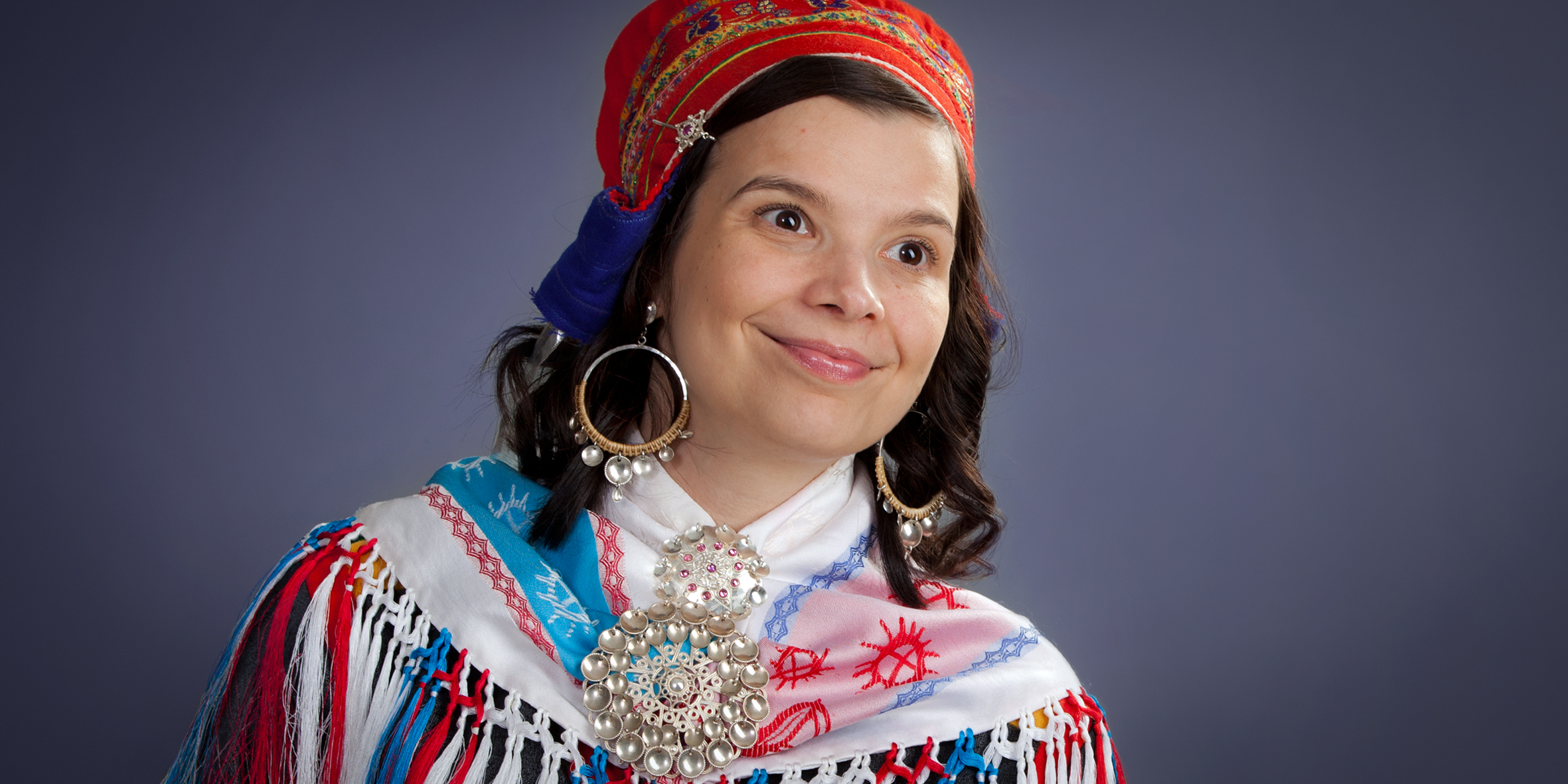
Postdoctoral researcher, Rauni Äärelä-Vihriälä (Sámi): Sharing stories to build better sustainable future- overwiev of Sámi pedagogy
Storytelling is a method in Sámi education for understanding the values, customs, and worldview of the community. Through stories, the environment and its events are narrated, spanning from the past to the future. In the oral tradition, stories are passed down from generation to generation, bringing tales preserved over centuries into new contexts. At the same time, new stories emerge, reflecting the experiences of a people living in harmony with nature’s cycles, as they face our changing environment. In Sámi education, storytelling focuses on the communal experience, where new generations shape their understanding of the world. In a time when answers are actively sought to stop climate change and promote sustainable development, stories can play a significant role. In education, sustainability and the changing climate should be addressed through the experiences of children and young people. Experiential and place-based learning is reflected in stories, which help in understanding the relationship with nature, place, and sustainability.
Rauni Äärelä-Vihriälä, PhD, is a postdoctoral researcher at the University of Lapland, Faculty of Education, working with the REBOUND project that is funded by the Strategic Research Council (SRC) established within the Research Council of Finland. The project concentrates on questions of intergenerational green transition. Her research fields are in Sámi education, especially digital learning, language immersion, and language revitalisation
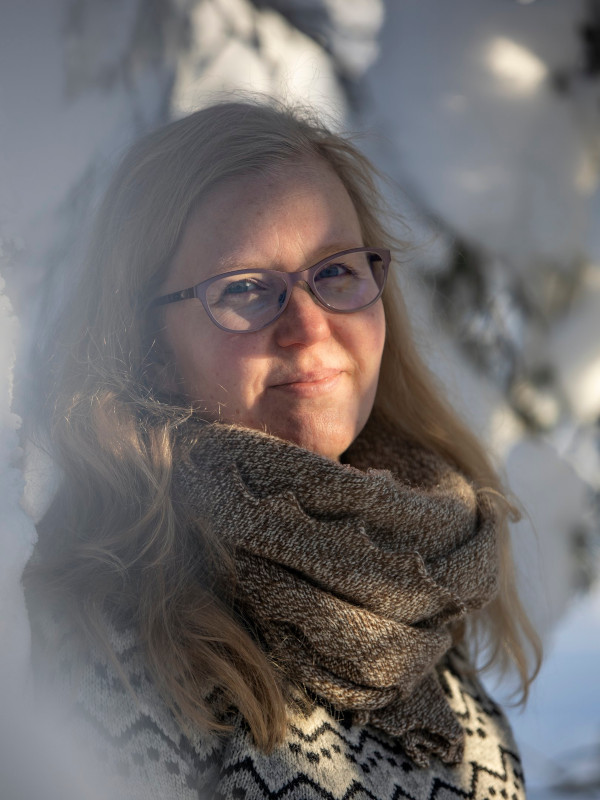
Professor Outi Rantala: Multispecies Storytelling in Northern Tourism
In her keynote professor Outi Rantala explores multispecies storytelling as a way to relate with more-than-human ways of being and knowing in the context of northern tourism. Her keynote is based on the collaborative work within the Intra-living in the Anthropocene (ILA) research group at the University of Lapland. During the past years, this group of multidisciplinary scholars has been experimenting with new ways of engaging with the present periods of ecological crises. The ILA-group suggests that multispecies storytelling as a genre could encourage us to slow down, attune with alternative rhythms and temporalities, listen to more-than-human concerns, and further mobilize inspiration, activism and hope.
Outi Rantala, PhD, Professor, Responsible Arctic Tourism, at University of Lapland, Finland and Adjunct professor, Environmental Humanities, at University of Turku, Finland, has focused in her research activities on creating critical, reflective and alternative narratives on northern tourism. Currently she leads a research profiling project on Multispecies hospitality (Profi7 MESH, funded by the Research Council of Finland). Rantala is an active member of several research networks, such as the OnebyWalking Network, Adventure Tourism Research Association, Sustainable Change Research Network, and University of Arctic’s Thematic Network on Northern Tourism.
Accommodation
The conference organizers have made bulk reservations for the conference guests.
Booking via conference registration form
The prices below are only for those bookings done via Rovaniemi-Lapland Congresses. Room quotas are valid until 29 September2024. The price is per day, including breakfast buffet, service and VAT.
Hotel Aakenus: single room 135 €/night, double room 145 €/night
Original Sokos Hotel Vaakuna: standard single room 145 €/night, standard double room 160 €/night
Arctic City Hotel: Classic room 1-2 persons per room 180 €/night
Please inform any changes to the Rovaniemi-Lapland Conferences (not directly to the hotel) by email congress@ulapland.fi.
NB! The registration fee does not include accommodation, hotel fees are to be paid directly to the hotel onsite. If you prefer billing, please inform us in the registration form. We have to check the possibilities of billing from each hotel.
Cancellation policy for hotel bookings made via registration from/Rovaniemi-Lapland Congresses:
- Cancellations must be made in writing to Rovaniemi-Lapland Congresses three (3) days prior to the planned date of arrival at the latest.
- All bookings cancelled later than this or bookings not cancelled at all will be invoiced in full.
- Without prior notice of late arrival, hotels have the right to give a reserved room away after 18:00. Please inform of late arrival in the note-field of your booking.
Booking directly from the hotel using discount code
Scandic Rovaniemi City and Scandic Pohjanhovi: booking scandichotels.com, discount code CCON
Guests can choose their preferred room type and receive an additional discount when paying for the reservation upon booking. The cancellation policy for individual bookings depends on the booking type chosen by the guest. To confirm the reservation, guests must provide a valid credit card information. Rooms are subject to availability and should be booked 10 days before arrival at the latest.
IMPORTANT DATES
- Submission of proposals/abstracts: 3th June, 2024
- Contributors will be notified: 7. June, 2024
- Registration opens: 28. August, 2024
- Registration deadline: 28. October, 2024
- Registration/Pre-symposium and Opening of the symposium and the exhibition: 4. November, 2024 at 18.00, Faculty of Art and Design.
- Symposium/exhibitions: 5.-7. November, 2024 at the University of Lapland
- The exhibitions are shown until: 21. November, 2024.
Location
The Relate North Symposium & Exhibitions will be held at The University of Lapland, Faculty of Art and Design, in Rovaniemi, Finland. We invite applicants to submit papers, workshops, panels or art works. The exhibition call is open to artists and designers in any media in traditional and contemporary art & design, in addition to presentations of community-based work, environmental art, or art education projects.
Every year, the Relate North Symposium & Exhibition attracts leading scholars and artists from around the circumpolar North to present research and debate issues of concern and interest for the Arctic and Subarctic regions through the lens of art and design. ASAD investigates questions such as: How might design practices respond to some of the challenges faced by those living in northern and Arctic areas today? What role might art play in chronicling and communicating issues that are important to people in the North? How might the visual arts represent a northern sense of place? This year specifically we are asking: what New Genre Arctic Art (Jokela et al. 2021) represents today in the Arctic, and what kinds of educational and social responses are called for during our current times of entangled transitions? How can this new genre – or indeed multiple new genres – of art help us to think through the wider issues that are relevant to the contemporary moment in the North?
Face-to-face and online
The event will primarily be arranged face-to-face, but some sessions will be conducted online. Keynote presentations will be streamed, while certain parallel sessions will be held exclusively in person. Exhibitions will be presented both in person and as part of an art catalogue, which will also be published online. Event is based on participation fee for all present and the fee will be announced later.
SYMPOSIUM THEME: New Genre Arctic Art Education
In the contemporary moment, we are currently witnessing a series of rapid eco-social changes in the Arctic that concern “green” energy transitions, natural resource prospecting and extraction, new national security alliances and an increase in military activity, expanding tourism and mobility infrastructures, and a warmer, wetter climate due to the effects of global warming. Development in new technologies and the now widespread use of artificial intelligence has been altering our perceptions of media validity, stretching the tensions between creativity and automation in our everyday lives. All of these changes are affecting our politics, cultures, economies, and our relations with the rest of nature. During such periods of flux, what can New Genre Arctic Art do to help us better understand and make visible the close-up realities of local communities in the Arctic? Where do Indigenous voices, together with non-Indigenous perspectives, find common ground on social and environmental issues, to ensure that art and education can perform positive transformative, inter-generational actions in our societies? And how can sustainable transitions be imagined when we consider the entanglement of the circumpolar North with the rest of the planet?
Relate North (12): New Genre Arctic Art Education aims to foster critical discussion and share experiences between our networked partners. The ASAD network is a unique opportunity to bring institutions in the Arctic region together to discuss, problematise and explore global and local issues highlighted by the symposium theme. The symposium is open for personal investigations as well as collaborative proposals, through the following sub-themes: 1) New Materialism, Entanglements, and Intra-disciplinary Dialogues in Art Education 2) Ecocultures and Transformative Art and Design and 3) Sustainable Transitions in the Arctic
New Materialism, Entanglements, and Intra-disciplinary Dialogues in Art Education
In response to New Materialist thinking which challenge traditional hierarchies, power relations, and pedagogical strategies, what new approaches and recuperative initiatives are needed across and between disciplines in research and art education? How do we ensure such dialogues are reciprocal in nature, acknowledging our entangled multispecies, technological, and intergenerational relations in Arctic settings? The theme includes formal, informal and non-formal art education and pedagogical turn of art.
Ecocultures and Transformative Art and Design
The recent decades have seen profound pedagogical and ecological turns in artistic practice and art education that can be framed in response to ongoing ecological crises and the rapid changes happening in our Arctic environments. This sub theme deals with the transformative potential of art and design in our societies to help us understand, adapt, create, and repair relations with the places and ecocultures we inhabit.
Sustainable Transitions in the Arctic
Transitions and rapid changes in technology, industries, energy, politics, media, and the climate, as well as the short and long-term effects of armed conflicts around the world, are each and all interconnected and shaping the global order of the contemporary moment. Where and how are these changes felt most strongly in the Arctic? What would a truly sustainable transition look like in the North, and who gets to decide how this is implemented? How can Indigenous voices be heard in this conversation? And what kind of transition are we really looking for when we speak about these themes in art, design and art education research?
SUBMISSIONS
ARTWORK SUBMISSIONS
The Relate North Exhibition is an opportunity to showcase artworks, collaborative, community, or arts-education projects from across the circumpolar Arctic that align with the symposium and exhibition theme: New Genre Arctic Art Education. Applicants can choose to exhibit the final artwork or some result of a process/project (sketches, drafts etc). In the exhibition catalogue each applicant has the opportunity to present the project in more detail and elaborate on its context. The exhibition is limited to 1 work or educational project per applicant, but we encourage 2 or 3 alternative artworks to be presented in each submission, if they each relate to the theme of the call and can be described using a common artist statement (see below). Each applicant is responsible for transporting the artwork to and from the symposium.
Artwork submissions must include:
- Title, medium, year, and dimensions
- Artist name(s): in the order in which you wish them to appear in the printed text
- Contact information: please include institutional affiliations, contact details including email, and website
- Artist bio (150 words max)
- Artist Statement (150 words max): Please describe the work and explain how the work relates to the theme. This statement is vital and will be used in the exhibition catalogue. If the artist’s statement is missing, the application will not be considered.
- Up to three (3) photos of each work you are proposing. Photos must be print quality, as they will be used for the exhibition catalogue (resolution 300 dpi, jpg format, file size max 8Mb). If you do not supply images at high resolution, your application may not be considered.
If your work is video based, please send us an embeddable link. Please ensure that we have all the info needed to access files (passwords, file share permissions, etc).
Delivery of the artworks will be discussed with the curators well in advance.
Artworks requiring mounting or installation, as well as all digital artworks, must be delivered to the University by 31. October, 2024, and artists are responsible for installing themselves, in dialogue with the curators. Artworks that require less demanding installation must be handed to the curators by 4. Nov, 12:00, at the Faculty of Art and Design, University of Lapland.
Curators of the exhibition are Maria Huhmarniemi and Neal Cahoon.
Submission form: https://forms.gle/vGkjU1wjRX79YiRt7
ABSTRACT SUBMISSIONS
Presentation 15 min + 5 min for questions
For the symposium we welcome abstracts for research papers:
- That investigate and respond to Northern or Arctic issues of New Genre Arctic Art Education through art, craft or design
- That describe projects or case studies exemplary of circumpolar collaboration (examples include land-based educational projects, Indigenous arts and cultural revitalization programming, collaborations between community-led arts-based researchers and scientists)
- That align with the symposium and exhibition theme: New Genre Arctic Art Education or one of the sub-themes.
Abstract submissions must include
- Title of presentation
- Abstract (150 words)
- Author name(s), in the order in which you wish them to appear in the printed text
- Short biography (100 words max). Please include affiliations, contact details including email, and website.
Abstract submission: https://forms.gle/5mKkvP75LEFyXkMn7
WORKSHOP SUBMISSIONS
Workshop timeframe: 1,5-2 hours
We invite you to submit proposals for a workshop in any area related to the theme of the symposium, New Genre Arctic Art Education. Workshops on challenging, emerging areas related to the symposium topics are especially sought. We particularly encourage proposals for highly interactive and collaborative workshops that focus on starting lively discussions to foster new ideas and gather feedback (rather than just defending the presented work). This applies to workshops that test new research questions, methods, analyses, perspectives, data material, or new research opportunities. Applicants are responsible for bringing and providing the necessary materials.
Workshop submissions must include:
- Title + topic and content of workshop
- The purpose of the workshop that you are offering. (150 words)
- Maximum number of participants.
- Need for space, location and set-up.
- Short biography (100 words max). Please include affiliations, contact details including email, and website.
Submission form:
https://forms.gle/VEqUzTA1u7z9T7jX7
PANEL SUBMISSIONS
Panel timeframe: 1 hour
Panels are a forum for discussing provocative, innovative, emerging, and boundary-spanning topics. While paper sessions provide detailed discussions of recently completed work, panels provide an opportunity to hear from researchers in our field converse about what is already here but not yet recognised, acknowledged, or discussed. Panels bring together several disciplines, methods, or approaches into a productive conversation, and typically represent a diversity of individuals, who can bring multiple perspectives to the topic.
We encourage those submitting to reach out to prospective panellists from across the ASAD network. A panel session builds on a theme and is proposed and planned by the panel organiser. The panel focuses on a common theme that is introduced in the beginning. The panel needs a chair (often the panel organiser) and one or more panel participants, who are prepared to discuss the theme. The symposium organisers decide how many panels are feasible at the symposium. The panel organiser is responsible for submitting the panel proposal including all the following elements:
Panel submissions must include:
- Title + topic and content of panel
- Panellist names and affiliations
- Panel abstract (up to 300 words) describing topic, questions, and panellist contributions as well as panel format.
Panel submission: https://forms.gle/TX2YcDGaJsrb4Q2S9
The symposium will take place:
University of Lapland, Yliopistonkatu 8, 96300 Rovaniemi, Finland
Questions regarding Relate North (12) should be sent to: Maria Huhmarniemi: maria.huhmarniemi (at) ulapland.fi
RELATE NORTH (12) ORGANISING COMMITTEE
Main organisers:
Timo Jokela, Professor of Art Education, Faculty of Art & Design and University of Lapland. Chair of Thematic Network of Arctic Sustainable Arts & Design
Mirja Hiltunen, Professor, Docent, Head of Department of Art Education, Faculty of Art & Design and University of Lapland. Leader of the Northern Art, Community and Environment Research Group.
Maria Huhmarniemi, Associate Professor, Faculty of Art & Design and University of Lapland. Member of the Northern Art, Community and Environment Research Group.
Neal Cahoon, Postdoctoral Researcher, Faculty of Social Sciences and University of Lapland. Member of the Intra-living in the Anthropocene Research Group.

